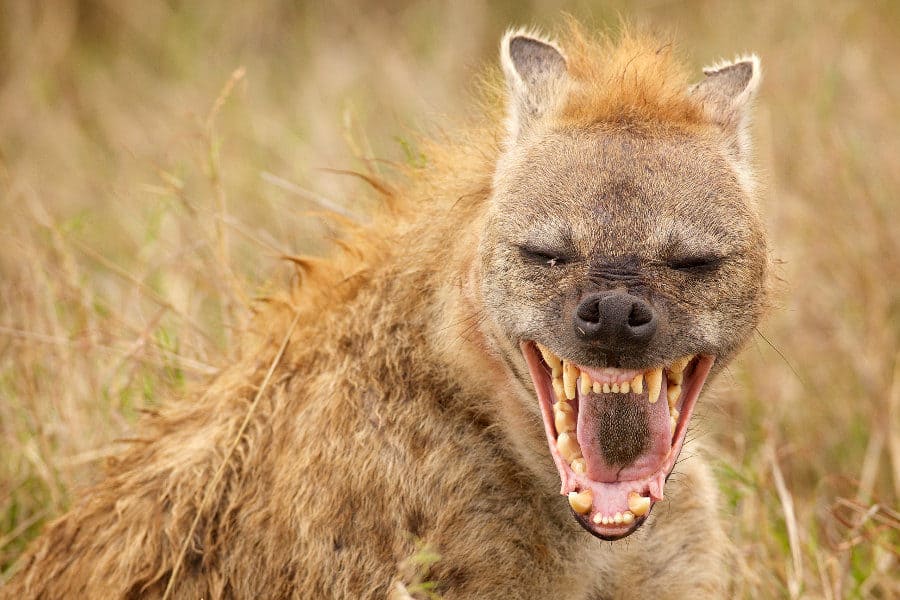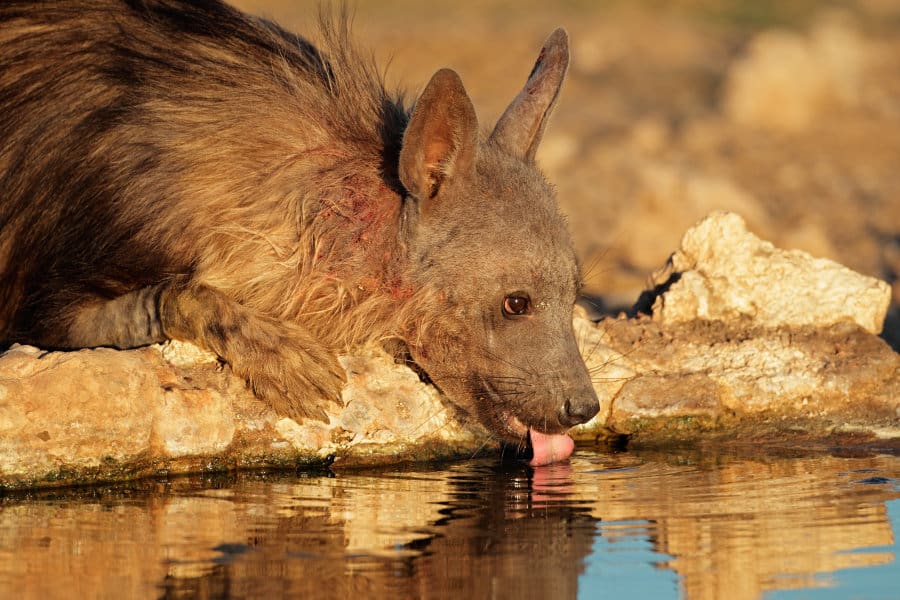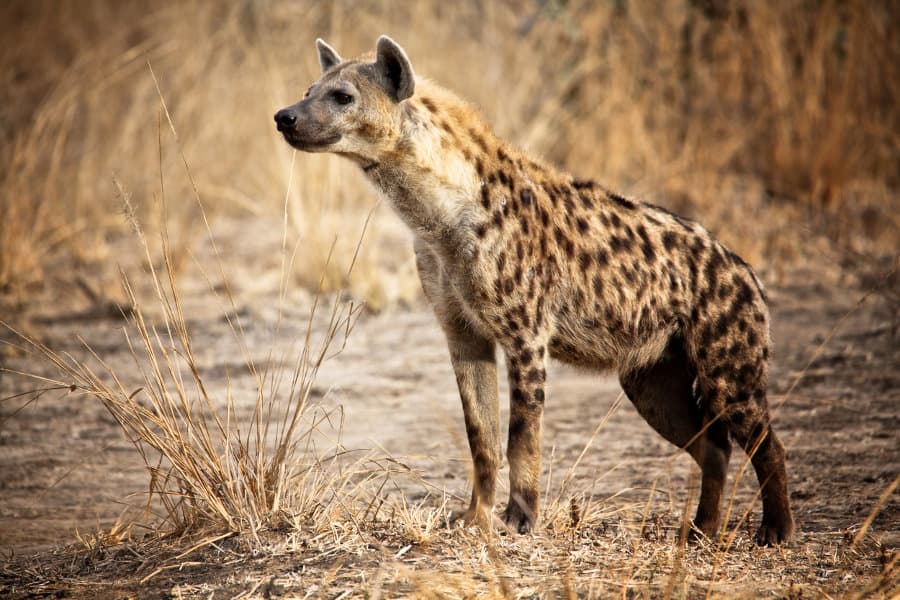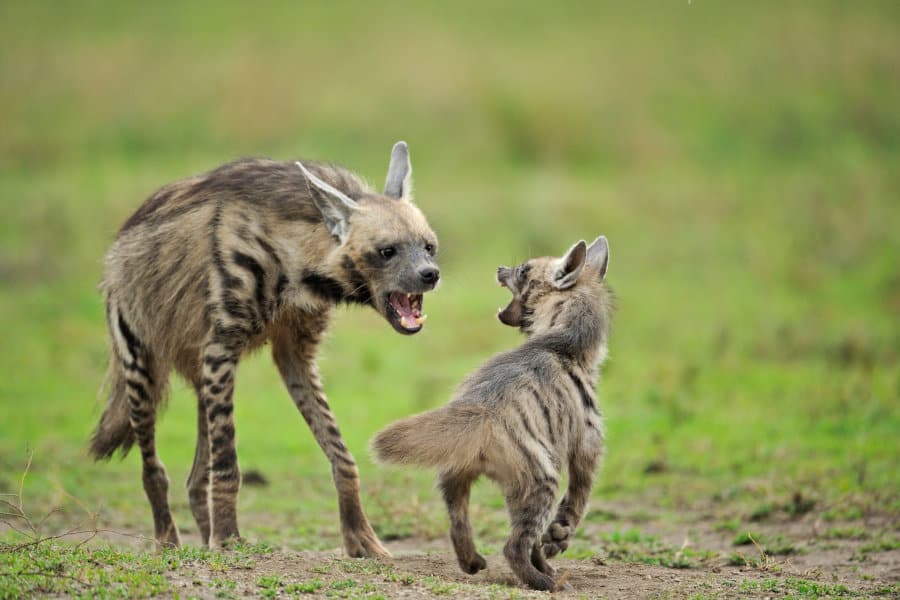Laughing hyenas are one of the great African myths.
Not all hyena make a distinctive hee-hee-hee sound. And while it sounds like spotted hyena are giggling, they are not expressing laughter.
So do hyenas actually laugh? And what do these funny sounds mean? Do hyena tell jokes around a campfire to get others laughing?
Here is the full story on laughing hyena, including answers to all those giggling questions you may be thinking.
Only Spotted Hyena Laugh
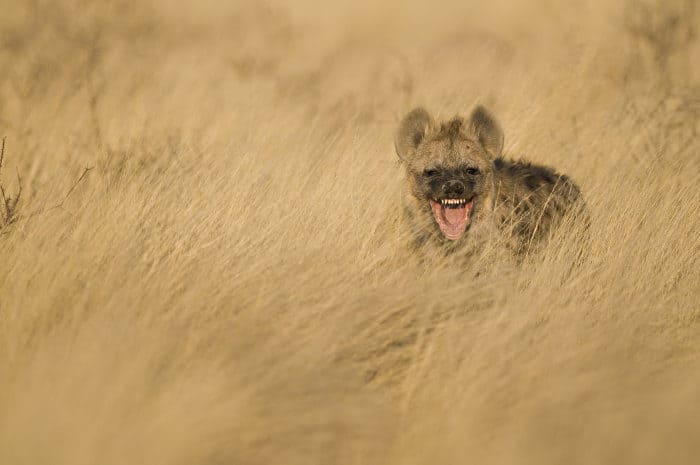
There are four species of hyena and none of them sound like Whoopi Goldberg in The Lion King.
Aardwolf are the forgotten member of the hyaenidae family tree. They do not giggle or laugh.
Brown hyena are incredibly rare. They live in the Kalahari Desert and cover incredible distances in search of food and water. While their calls echo across the desert, brown hyena do not laugh.
Striped hyena can be found everywhere from Iran to Morocco to Tanzania. They are even mentioned in the bible. Here is the complete story about striped hyena. No, this hyena does not laugh either.
Spotted hyena are the most common hyaenidae. These creatures are responsible for most of our hyena myths and perceptions. And they are the hyena that laugh.
Hyenas Laugh to Communicate. Or Do They?
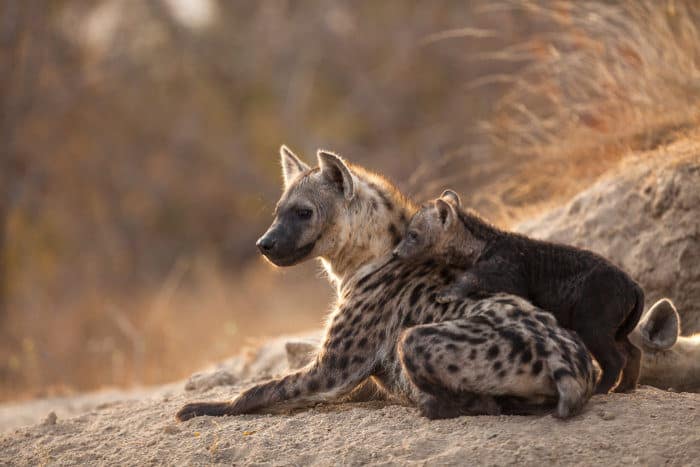
While it may seem like hyena are “laughing”, the sound they produce is actually an alternative form of communication.
Just like other mammals, communication between hyenas is used for many different purposes, including building social bonds, coordinating group activities, and recruiting allies to a cause.
They communicate through a wide variety of sounds, including lowing, cackles, giggles, growls, whines and whoops. They also have a very recognizable howling call, which sounds a little like oooooooo wooo, oooooooo wooo.
The lowing sound is a lot like a mooing cow, but in a slightly lower tone. This is used by clan mates when they want to form an alliance and team up against lions.
Mothers use a distinctive groan to tease their cubs out of the den. They groan into the hole and the youngster will quickly peer out.
Cubs make a horrible sound similar to grating human nails across a blackboard. This is known as squitting and tells a mother they want to eat.
Another clear sound is the alarm call, a resonant and rapid cluster of sounds that alert the clan of impending danger.
Perhaps most impressive of all the sounds is the whoop (no, not the Whoopi Goldberg).
These calls travel three miles across the savannah and their speed indicates the importance and emotion behind the call. Quick howls mean notice me and will attract animals from all around.
Click on the play button below and enjoy typical “laughing” hyena sounds. 🙂
Are the hyenas actually laughing? Did they just find something funny?
When Do Hyenas Laugh?
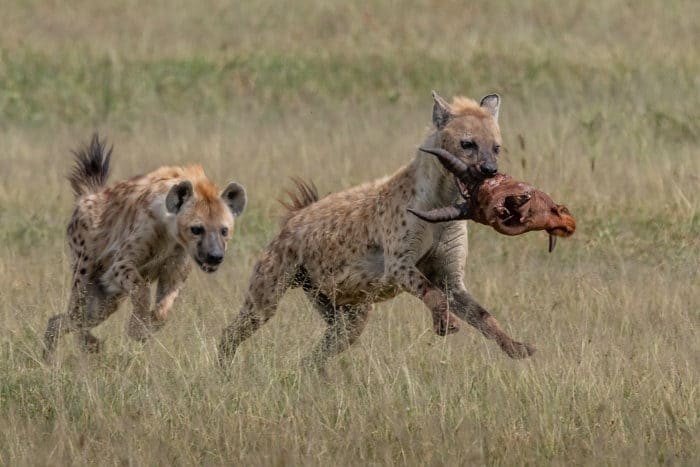
Spotted hyenas are commonly known as the laughing hyenas, but laughter does not mean they are sharing a joke.
These funny noises may express excitement, nervousness (when confronted by lions for instance), and are also often produced when the animal is on the prowl for food. Entire clans also produce maniacal laughter when they kill prey.
Studies have shown that laughing sounds are made in a huge variety of circumstances. Spotted hyena start giggling when feeding on a carcass, but also when engaging in physical fights among each other.
Strangely, spotted hyena also laugh when they are being attacked by rivals. Perhaps they are being sarcastic and saying “ha ha, you can’t catch me!”
When a spotted hyena runs off with part of a carcass it will giggle. Another hyena will give chase and also giggle. This will alert more hyena, who pick up the chase and harass the carcass carrier even more.
What sound do you make when excited and also nervous? It is probably a laugh. But does that mean hyena are actually laughing?
Are Hyena Actually Laughing?
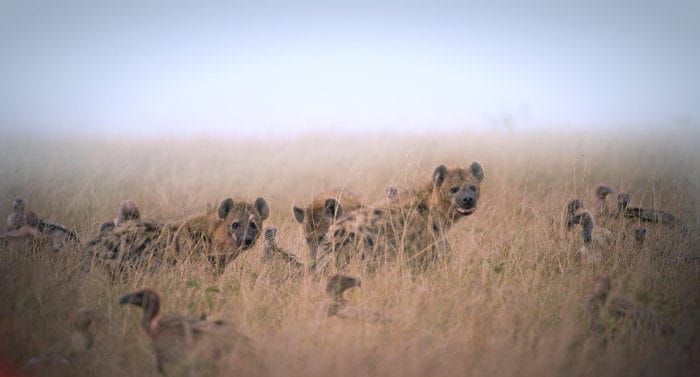
No they are not. Humans are using a human emotion and behaviour to understand the actions of a wild animal. Laughing hyena do not find something funny. The reality is completely the opposite.
Every laugh indicates the social status of a hyena. Subordinate hyena laugh at a higher pitch. Not only do dominate hyena make a lower sound, their laugh is at a more consistent pitch.
Human ears cannot hear all the nuances around pitch and volume. These correlate to age and social status. Through these giggles a hyena can understand where it stands in the social hierarchy.
Whether excited or nervous, researchers have found that hyena laugh at times of social conflict. Mostly this is when they are fighting for food, feeding on a carcass, or getting into physical battles.
At all these times there is conflict. Even when a clan feeds on a carcass there is an important social hierarchy dictating who gets to eat the choice cuts.
It seems that all this laughing is not necessarily a natural reaction. Instead, hysterical giggling may come out unconsciously. It can also create problems because laughing alerts other hyena to social conflict.
When a little piece of food attracts lots of hyenas, the intense competition can turn bloody. They chase each other in search of a single bite, nipping and gouging at any hyena carrying a carcass.
All this is like hyena bullying. The unfairly targeted hyena can be wounded, both physically and mentally. And at this time they produce the loudest and longest hysterical laughter.
This is why researchers believe that laughing hyena are actually voicing their frustration, a complete contrast to why humans laugh.
More Animal Sounds

Did you know that elephants produce sounds that humans cannot hear? Do you know the sound a giraffe makes?
How about the sound of a rhino? Or the sound of a hippo?
At Africa Freak we celebrate wild Africa and have articles about most of the animals you can see on an African safari.
So keep exploring, because Africa’s incredible wildlife will help you connect to your wild side.
